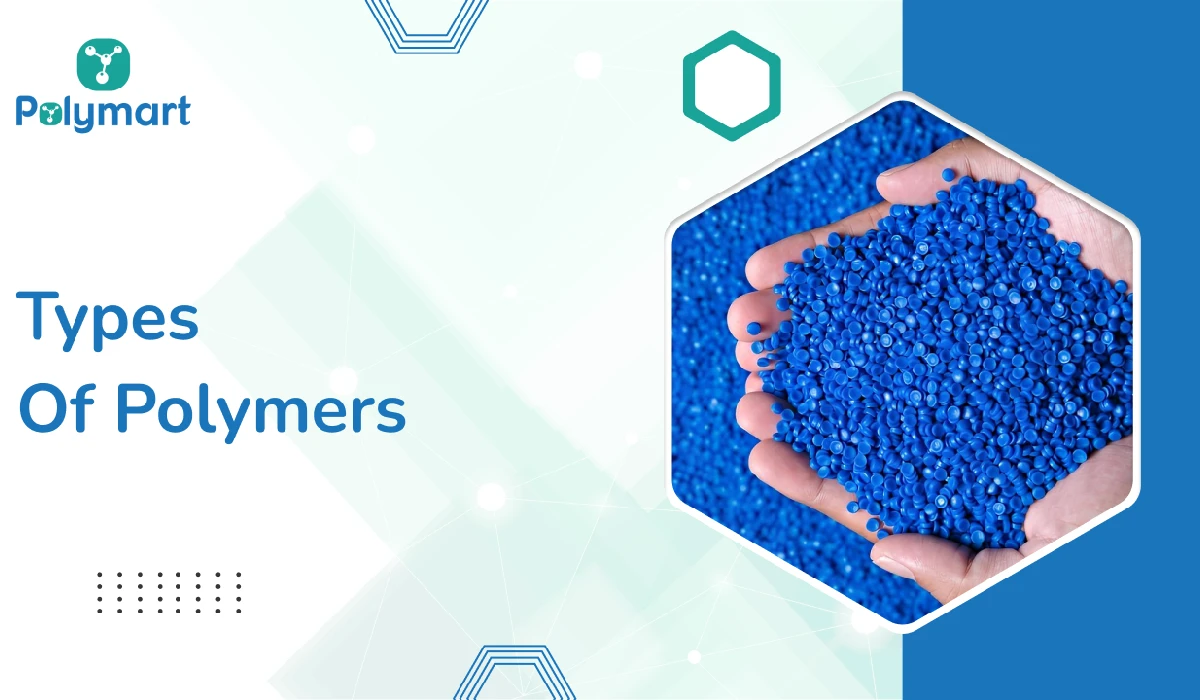
Polymers have become the talk of the town lately, and for all the right reasons. They are versatile, durable, and cost-effective, having use cases across industries such as packaging, construction, automotive, healthcare, electronics, and textiles.
The global polymers market reflects this growing demand. In 2024, the market was valued at approximately USD 792.57 billion and is projected to reach around USD 1,341.04 billion by 2034, growing at a compound annual growth rate (CAGR) of 5.4%.
And, because of the range of benefits it offers to businesses and its sustainability factor, the demand for polymers will continue to grow. Plus, there are different types of polymers available for different use cases and industries.
In this blog, we will be covering different types of polymers that every business should know about. Let’s get into it.
Types of Polymers To Know About!
Polyethylene (PE)
It is one of the most commonly produced polymers globally, known for its versatility, chemical resistance, and durability. It is made by polymerizing ethylene monomers and is available in several grades based on density and branching.
Subtypes:
- HDPE Polymers(High-Density Polyethylene): Used in pipes, containers, and bottles.
- LDPE Polymers (Low-Density Polyethylene): Found in plastic bags, squeeze bottles.
- LLDPE Polymers (Linear Low-Density Polyethylene): Common in stretch films, liners.
Industries: Packaging, construction, agriculture.
Polypropylene(PP) Polymers
It is a widely used thermoplastic polymer known for its fatigue resistance, chemical stability, and lightweight nature. It is produced by the polymerization of propylene monomers and is valued for its strength and moldability across various applications.
Subtypes:
- Homopolymer PP polymers: Used in textiles, packaging, and automotive parts.
- Random Copolymer PP polymers: Found in medical products and food containers.
- Block Copolymer PP polymers: Common in industrial uses and automotive components.
Industries: Automotive, packaging, textiles.
Polyvinyl Chloride (PVC)
PVC is a versatile and durable polymer derived from the polymerization of vinyl chloride monomers. It is known for its rigidity or flexibility depending on additives, and its strong resistance to chemicals and weathering.
Subtypes:
- Rigid PVC (uPVC): Used in pipes, doors, and windows.
- Flexible PVC: Found in cable insulation, hoses, and flooring.
Industries: Construction, electrical, healthcare.
Polystyrene (PS)
It is a transparent thermoplastic polymer made from styrene monomers. It can be manufactured into solid or foam products and is valued for its ease of molding and lightweight properties.
Subtypes:
- GPPS (General Purpose): Used in CD cases, disposable cutlery.
- HIPS (High Impact): Found in refrigerator liners, toys.
- EPS (Expanded): Common in insulation and packaging.
Industries: Packaging, electronics, consumer goods.
Polyethylene Terephthalate (PET or PETE)
PET is a strong, lightweight thermoplastic polymer known for its excellent clarity, moisture resistance, and recyclability. It is widely used in both rigid and flexible packaging and maintains its shape under stress.
Subtypes:
- APET (Amorphous): Used in clear food containers and blister packaging.
- CPET (Crystalline): Found in microwaveable meal trays.
- rPET (Recycled): Common in sustainable textile and bottle production.
Industries: Food and beverage, textiles, consumer packaging.
Acrylonitrile Butadiene Styrene (ABS)
ABS is a tough, impact-resistant thermoplastic made by combining acrylonitrile, butadiene, and styrene. It offers excellent dimensional stability and a glossy finish, ideal for high-strength, lightweight products.
Subtypes:
- General Purpose ABS: Used in keyboard keys, phone casings.
- High-Impact ABS: Found in helmets, tool housings.
Industries: Automotive, electronics, consumer goods.
Nylon (Polyamide or PA)
Nylon is a synthetic polymer known for its high mechanical strength, thermal stability, and abrasion resistance. It is available in several formulations depending on the carbon chain structure.
Subtypes:
- Nylon 6: Used in textiles, films, and industrial yarns.
- Nylon 6,6: Found in automotive parts, gears, and bearings.
Industries: Automotive, textiles, industrial equipment.
Polycarbonate (PC)
It is a transparent, high-impact resistant thermoplastic that offers excellent dimensional stability and thermal resistance. It can be easily molded without sacrificing strength.
Subtypes:
- Clear PC: Used in eyewear lenses, safety shields.
- Glass-Filled PC: Found in durable electrical and structural components.
Industries: Electronics, automotive, construction.
Final Thought:
Polymers are the backbone of countless industries, shaping everything from everyday packaging to advanced automotive and construction materials.
With their wide range of physical, chemical, and thermal properties, different types of polymers are suited for different applications, making it essential to choose the right one based on specific use cases.
As industries continue to evolve, so does the innovation in polymer technology. So, based on your business needs, industry type, and use case, make sure to choose the right type of polymer from a reliable provider to get the benefits your business deserves.
Well, if you are looking to buy polymers online or even sell them, check out Polymart. It is a leading platform to buy and sell polymers. Well, check it out right away to access high-quality polymers at the best rates and fulfill your business needs.
